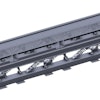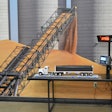
Have you ever looked at your business as if you were a new customer? How would they like to be served as a customer? Do your employees go out of their way to do the “little things” which make a difference? Would you do business with your business? Some folks may argue that superior customer service might be more important for retail stores, rather than a business like a grain elevator or feed mill. But it can make a difference in the competitive feed and grain industry — for the very reason that it is competitive. You do have competitors, and attracting and keeping more business is a desirable strategy.
Customer service as a strategy
Think of an exceptional experience you have had as a customer of some business you frequent. What made it exceptional? Perhaps an employee went out of their way to assist you. Maybe they worked really hard or in an innovative way to earn your business. Possibly they provided you with something you did not expect. Now think of what this did to you as a customer. Perchance their service has made you a “customer for life.” Or, if you were like many of us — you were so impressed you told others about your experience. And, you possibly increased the volume of business you do with this company.
一个说明性的例子可以帮助把这个perspective. One of us (Foltz) had just such an exceptional experience with a tire company : Les Schwab Tire Centers, located in the Pacific Northwest. I was travelling out of town at 4:45 a.m. on a cold wintery morning to catch a flight at the local airport. I had been driving through the snow, noticing my car was pulling hard to the right on the icy, rural highway going to the town where the airport is located. I stopped at a convenience store to fill my tire with air (my tire was almost completely flat) and realized that I had a slow leak in the tire. I continued to the airport, checked in and took my flight to complete my business. However, I was dreading returning to the airport — late in the evening, and still an hour from home — knowing that I would find a flat tire on my vehicle. I called the local Les Schwab dealership (not my local dealer, from whom I have bought tires for 25 years), and explained my situation. The manager indicated they would be happy to go to the airport with their service truck and fix my tire. I indicated that I would be more than willing to pay (to alleviate my significant inconvenience upon returning home) — and he said — “No, we are happy to do this for you, our customer.” Needless to say, while I have always done business with Les Schwab (their employees have the most “hustle” of any business I have ever dealt with) — I am definitely a customer for life! And … I have told a number of people this story, along with telling them how much I love doing business with this company.
Now, translate what the above illustrations mean to the business in question; increased customer retention; marketing/PR via word -of-mouth advertising; and finally increased sales. And all of these benefits can be had just by working with your employees to pay attention to detail, empowering them to do the right thing to assist your customers, and incorporating strategic customer service into your feed and grain firm’s strategy.
Knowing your customer’s wants, desires, values
Many of the products and services your firm provides are certainly the ones which your customers want, desire and are willing to pay for. However — as we discuss above — are there things you can do, services you can provide, which will “cement” that relationship? One way of determining what your customers will value, and/or desire is to ask them. A customer survey is one way to gather this information. We have touched on this tool in our Manager’s Notebook column previously — see “How Surveys Can Enhance Your Business,”Feed & Grain, January 2012.
A quick summary of that column is that the results of a survey can be a great source of input as you make changes to move your grain and feed business forward — particularly if you question them regarding specific customer services they would value. If you do a survey, be sure to let your customers know you paid attention to their input and their input influenced the actions of your business. People appreciate knowing their voice has been heard and appreciate it even more when they realize that suggestions were followed up on.
Keys to good customer service
As we mention in our introduction to the customer service topic — some of the items on the to-do list do not cost much, and can be accomplished by your dedicated and informed employees. Emphasize to your folks they can make your customers feel important and appreciated, and treat them as individuals. Your employees can do this by always using the customers’ name and by finding ways to complement them, making sure it is with sincerity. And thanking your customers for their business at every chance is always an excellent thing to do.
As an owner/manager, appreciate the power of “yes.” When your customers have a reasonable request, tell them that you can do it and then figure out how to deliver. Look for ways to make doing business with you easy!
Another suggestion by the customer service “gurus” is to give more than expected. Think of ways to elevate yourself above the competition. What can you give your customers that they cannot get elsewhere? What can you give your customers that is totally unexpected? Are there ways you can follow up and thank people even when they don’t buy or use your services?
Build an effective problem-solving process
Micah Solomon, customer service consultant, keynote speaker and the author of the book, High-Tech, High Touch Customer Service, says, “Expect things to go wrong, and be prepared to treat customers well — like family, practically — when they do.”
Solomon calls his secret the “Italian Momma method.” He explains, “Think of your customer as the little bambino that took a spill on the sidewalk. Channel your inner Italian mother and shower your customers with attention and genuine concern — just like she would on her little “bambino” — when they come to you with an issue.” Solomon argues if you go significantly out of your way to make things right, the customer’s perspective of the situation will wind up getting “reset.” “Essentially, the mountain shrinks into a molehill,” he says. He goes on to state, “Whatever you do though, never try to convince them that it was not such a big deal. Let the customer make it clear,” that it’s OK to move on to the problem-solving phase. “Doing so makes for a smoother interaction for everyone involved,” says Solomon.
This approach might be likened to turning “a sow’s ear into a silk purse.” How we operate when things go bad says a lot about how things work when everything is running smoothly — and your customers will take note. In addition, we make the argument that keeping a customer is definitely worthwhile, as it is six to seven times less expensive to keep a customer than the cost of getting a new customer. A great graphic discussing this concept can be found at:https://www.avaya.com/en/products/experience-platform/l.
You might also find this graphic useful, which outlines the price of bad customer service:https://www.avaya.com/en/products/experience-platform/.
Ideas for the feed and grain industry
所以,你读过tho通过我们的客户服务ughts, and agree that you will commit to ramping up customer service in your feed or grain company. How do you operationalize such a strategy? First off, we might suggest convening a meeting of your employees and have a “brainstorming” session to have them generate ideas. Initiate this meeting with a discussion of the importance of customer service; perhaps solicit stories or examples as we have shared above — to drive home the concept that customer service is valuable for your business. Then, develop a list of possible action items your employees can start to implement. Having your employees generate their own ideas will help you implement your strategy — as some of the ideas they are implementing will be their own.
Here are some ideas which might help to facilitiate your own brainstorming:
For Feed Customers:
- Offer to track feed use (via your salesperson or feed truck driver), so as to allow continuous feed inventory flow for your customer (i.e., they don’t have to order feed — you take on this responsibility for them). Obviously, you would need to decide what size customers you would want to provide this service to — probably not a producer who has 20 chickens or 10 sows.
- Sometimes there are things you can do which benefit you and your customer both. A customer service example might be providing a bulk bin purchase program for your customers, so that if they sign a contract to purchase x tons of feed from you, that you build the purchase of a bulk bin into the program. This allows them to receive the use of an asset which they can utilize and receive labor-savings from. You can then deliver bulk feed to them — which also saves you time and effort — and you continue to draw them “closer” as a customer as well.
For Grain Customers:
- You as manager or one of your grain merchandisers could call customers periodically to inform them of key market movements. You might establish a key customer list, for whom you offer this service, and set key parameters which (for example, 10 cents/bushel market movement) will generate these calls.
- Offer bottled water and/or candy bars to truck drivers waiting in line to dump grain at harvest.
Customer service — the right thing to do!
While customer service might not rank up there with other management topics like asset management, financial leverage, good personnel management or an active advertising program — it is something that is definitely worth paying attention to. And in fact customer loyalty is probably one of the key tenets successful managers strive for. It does not cost much more than being innovative, having your employees be customer minded and maybe stretching yourself to respond to some requests. But the payoff can be substantial — and will certainly give you warm fuzzies as well! ❚
Dr. John Foltz is Dean, College of Agricultural and Life Sciences and Professor, Department of Agricultural Economics and Rural Sociology, University of Idaho, Moscow, ID.Dr. Christine Wilson is Assistant Dean, College of Agriculture and Professor, Department of Agricultural Economics, Kansas State University, Manhattan, KS.






















